
You can use these soft and fluffy gluten free crescent rolls in any recipe calling for Pillsbury crescent rolls. Super easy to make & dairy free option!
Updated September 2023
Missing soft and fluffy rolls, or the ease of making a quick recipe with Pillsbury crescent rolls?
You're in the right place because this easy gluten free crescent rolls recipe is going to become your go-to!
This gluten free crescent roll dough is so versatile we've used it for cinnamon rolls, chicken roll-ups, monkey bread, and much more!
It works as a perfect substitute for any recipe calling for Pillsbury crescent rolls or as a standalone side to your favorite dinner.
If you have celiac disease or food allergies, don't believe the lie that you have to settle for sub-par food!
It is possible to make all your favorites including delicious gluten free crescent rolls that will taste every bit as good as their gluten counterparts.
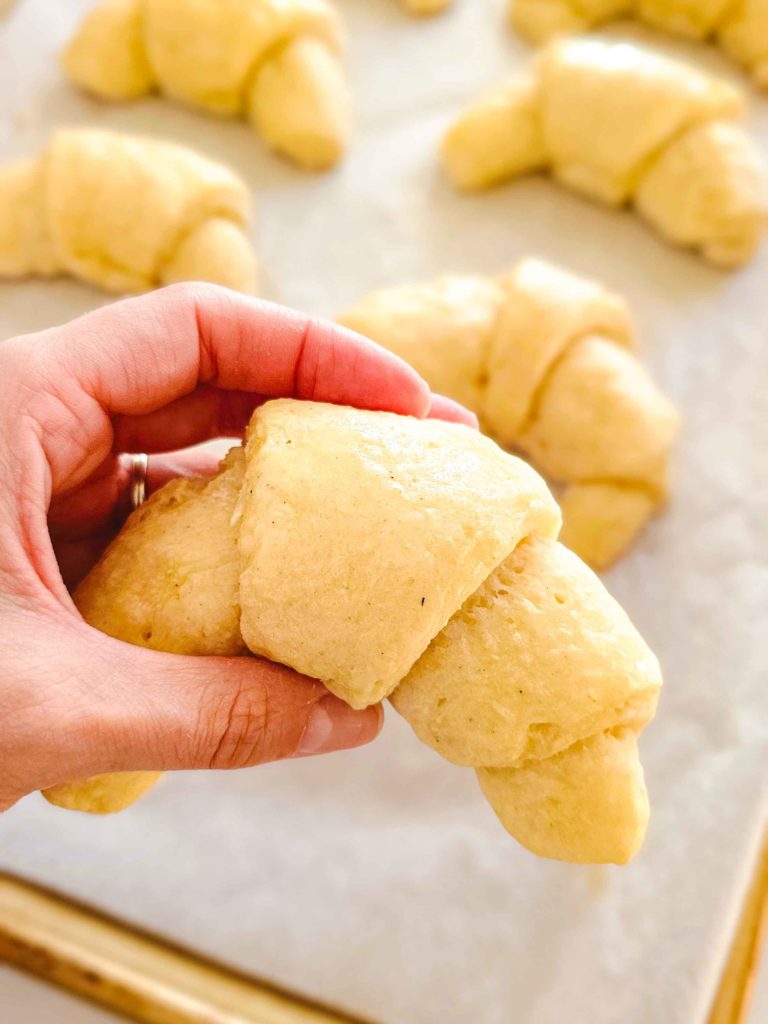
Bonus: you won't need a long list of different flours or funky ingredients (unless, of course, you want to make your own flour blend which totally works!)
Get creative and let me know in the comments how you use this versatile dough!
ps If you're looking for gluten-free croissants, I have a recipe for those in my cookbook!
WAIT! Don't lose this post! Save this image on Pinterest
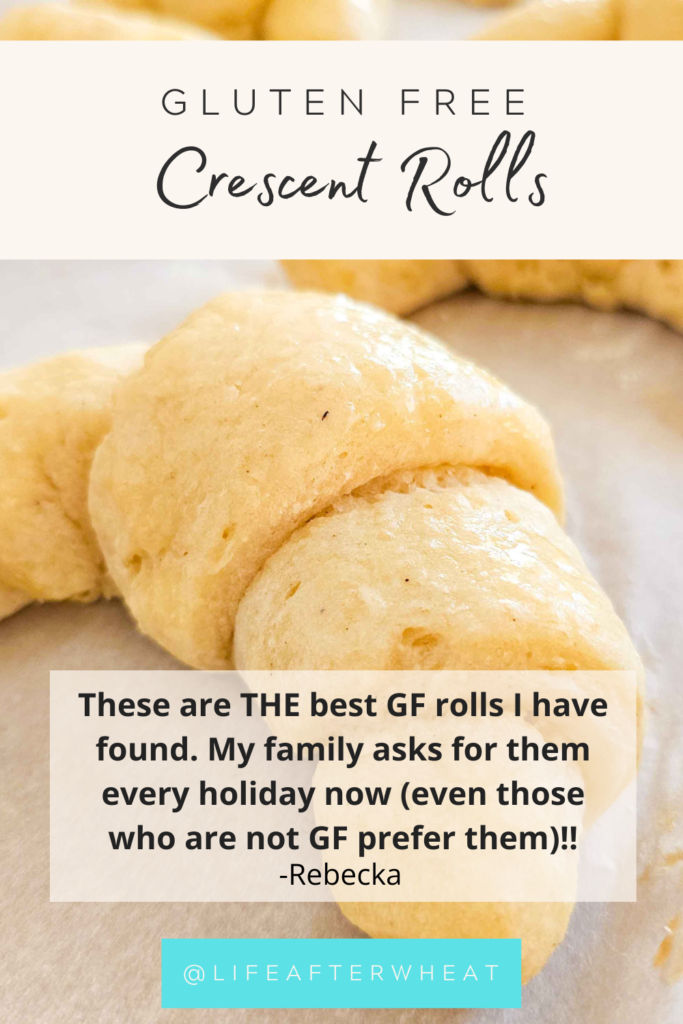
Table of Contents
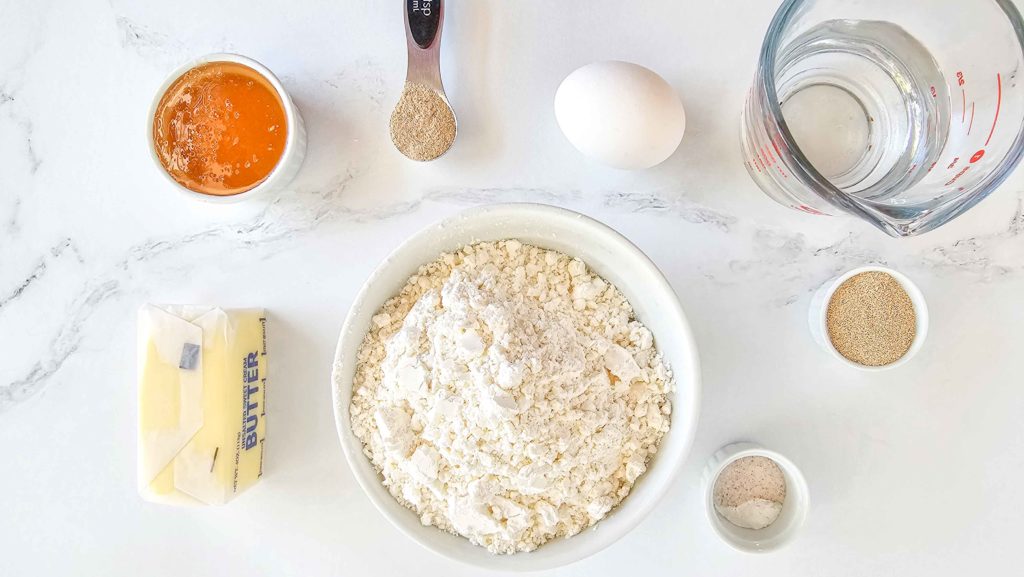
INGREDIENTS IN GLUTEN FREE CRESCENT ROLLS
- high quality gluten free flour blend gfJules is definitely my favorite, more on that below!
- yeast I prefer instant yeast because it rises faster, but you can use active dry as well. Always check the labels as some yeast products are not gluten free.
- sugar or honey
- baking powder
- salt
- warm water barely warmer than room temp. You might need to adjust the amount based on flour used, how you measured the flour, or humidity. There are a lot of factors that affect the amount of water needed in a roll recipe.
- egg if you're dairy free, an egg replacer like Bob's Red Mill will work great too
- butter at room temperature or you can use melted butter that has cooled. Feel free to use a vegan substitute or a neutral tasting oil such as canola or avocado.
- psyllium husk powder this is optional, but does improve the texture so I recommend using it.
- potato starch (can use flour, but starch works best) for dusting your work surface when you roll out the dough.
- Extra butter to brush over the tops after baking
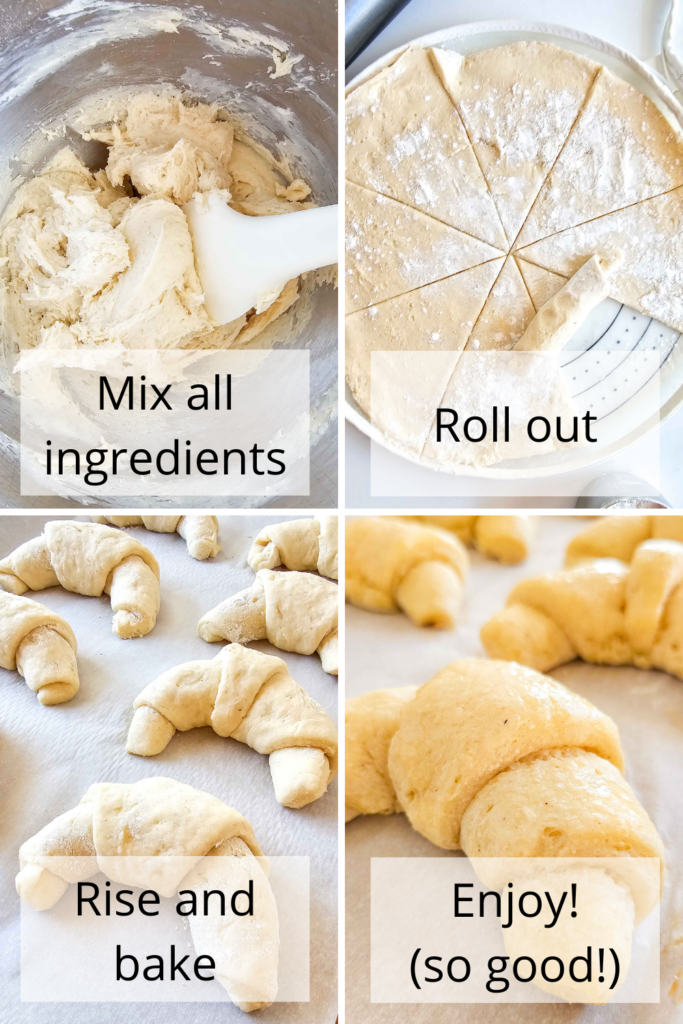
HOW TO MAKE GLUTEN FREE CRESCENT ROLLS
Step 1: Mix Ingredients
No need to proof the yeast, just add all the ingredients to the bowl of a stand mixer and mix for a few minutes.
Use the paddle attachment, not the dough hook attachment.
Gluten free dough needs more moisture than traditional dough so the dough should be soft and very sticky, like a thick banana bread.
Step 2: Roll Out & Shape the Dough
Because gluten free crescent dough is extra sticky, I recommend using a pie bag lightly dusted with gluten free flour or starch. You can also use two pieces of parchment paper or just a countertop.
Turn the dough out onto a lightly floured surface and roll out to a 14" circle using a rolling pin.
Use a pizza cutter or knife to slice into 8 wedges, like you would slice a pie.
Starting at the wide end, roll up tightly until you get to the point, and gently press it to the rest of the roll. Curve into a crescent shape and transfer to a baking sheet.
PRO TIP: Using a pie bag and pizza cutter makes this process much easier!
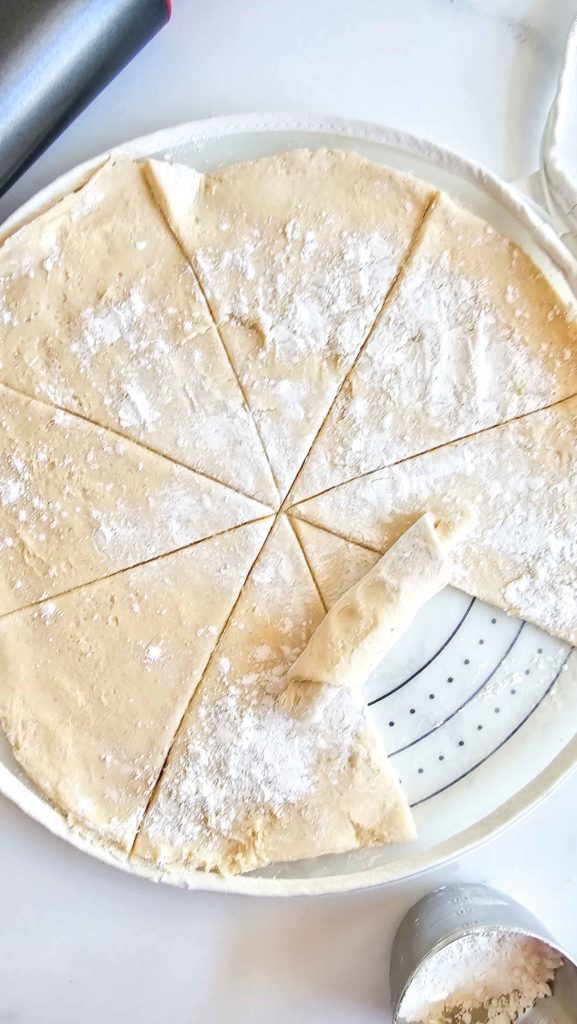
Step 3: Rise
Cover the rolls loosely with plastic wrap or a light towel and let the rise in a warm place for 30-45 minutes until they are doubled in size.
PRO TIP: Use the proof setting on your oven to speed up the process! If you don't have a proof setting, you can heat your oven to about 110 degrees F then turn it off and place your rolls inside.
Step 4: Bake
Once the rolls have doubled in size, it's time to bake! These only take about 10 minutes so they'll be ready in no time.
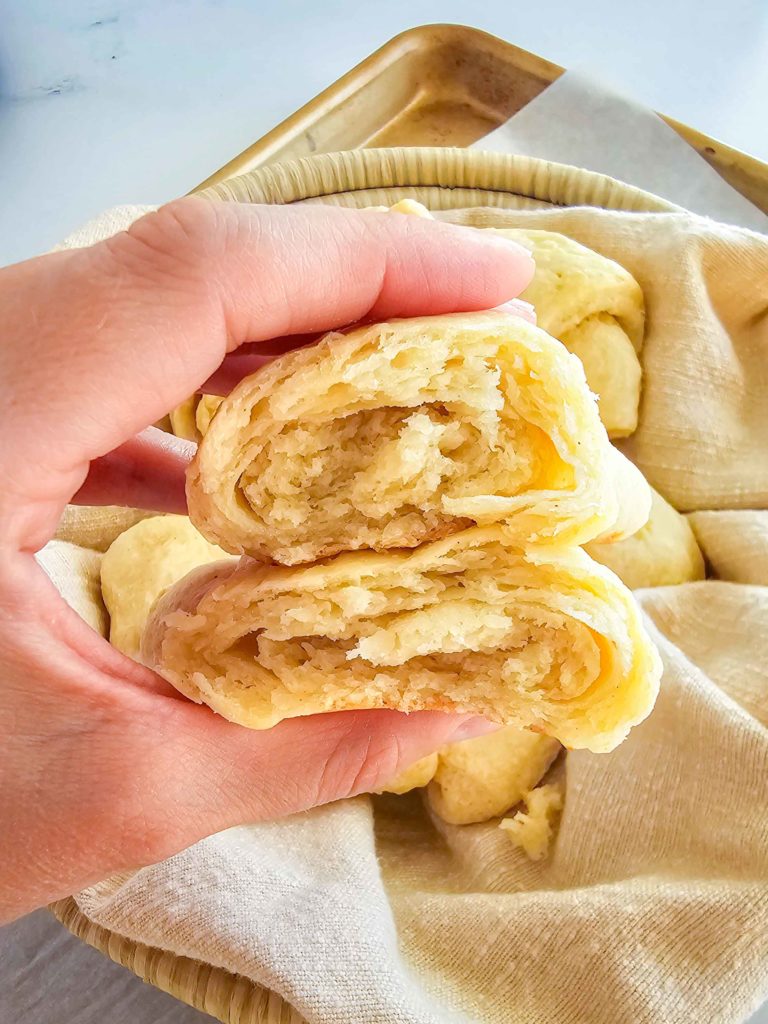
WHAT IS THE BEST GLUTEN-FREE FLOUR TO USE WITH YEAST?
Gluten free breads and rolls can be finicky, so it is important to use a high-quality gluten-free flour blend that is specifically formulated for those types of recipes.
Many people find success using a homemade flour blend, while others prefer a pre-made blend purchased at the store.
gfJules is considered the best gluten-free flour in the industry for yeast recipes and yields super soft and fluffy results.
Whatever you choose, be sure to use a flour blend that contains xanthan gum, which acts as a binding agent that replicates the effects of gluten in baked goods.
WAYS TO USE THIS RECIPE
This gluten-free crescent roll dough is so versatile! Here are some fun ways to use gluten free crescent roll dough:
- Try wrapping around hot dogs to make pigs in a blanket!
- Use as pizza crust
- Substitute in any recipe calling for Pillsbury crescent rolls
- After rolling out the dough, spread with a thin layer of finely chopped semi-sweet chocolate before rolling to make gluten free pain au chocolat
- Brush with a generous helping of honey butter as soon as they come out of the oven
- Make gluten free resurrection rolls or gluten free cinnamon rolls
Once baked, these buttery gluten free crescent rolls taste great along any soup or dinner entree!
My family loves them with my Panera Bread 10 Vegetable Soup Recipe or Instant Pot Wisconsin Cauliflower soup, alongside a gluten free casserole or Cranberry Kale Salad.
CAN YOU FREEZE THESE?
Yes! Gluten free crescent rolls freeze well before or after baking.
To freeze the dough before baking:
Roll out and form crescent rolls as directed, then flash freeze individually before transferring to a Ziploc freezer bag.
When you're ready to bake, allow about an extra hour for them to thaw on the baking sheet before rising.
To freeze the dough after baking:
Allow the baked crescent rolls to cool completely transferring to a Ziploc freezer bag.
When you're ready to enjoy them, allow to thaw at room temperature and then warm in the microwave for a few seconds or wrap in foil or parchment and heat in the oven at 325 degrees F for 5-10 minutes.
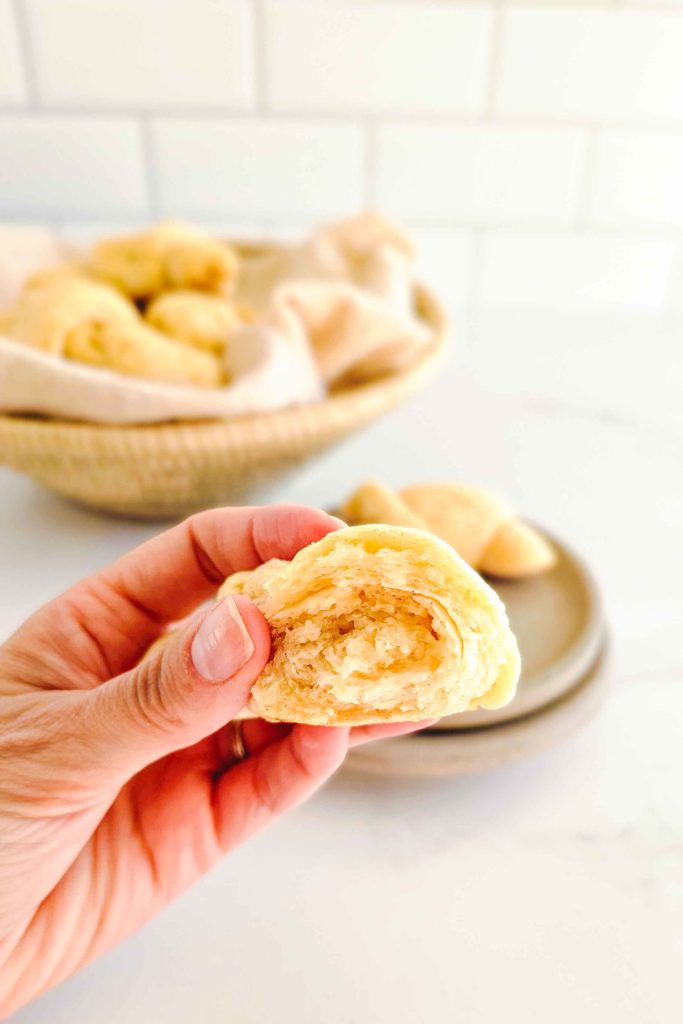
HOW TO MAKE GLUTEN FREE & DAIRY FREE CRESCENT ROLLS
Gluten free crescent rolls can easily be made gluten free by using a neutral-tasting oil or vegan butter substitute. I recommend Melt brand for the best flavor and texture.
HOW TO MAKE GLUTEN FREE & VEGAN CRESCENT ROLLS
Gluten free crescent rolls can be made vegan by using an egg substitute. I've had great success with Bob's Red Mill egg replacer.
In addition, you'll need to swap the butter for a dairy-free substitute or use a neutral-tasting oil.
I do recommend butter for the best flavor, and Melt brand vegan butter is my favorite. Be sure to use the stick variety as it has the correct fat content for this recipe.
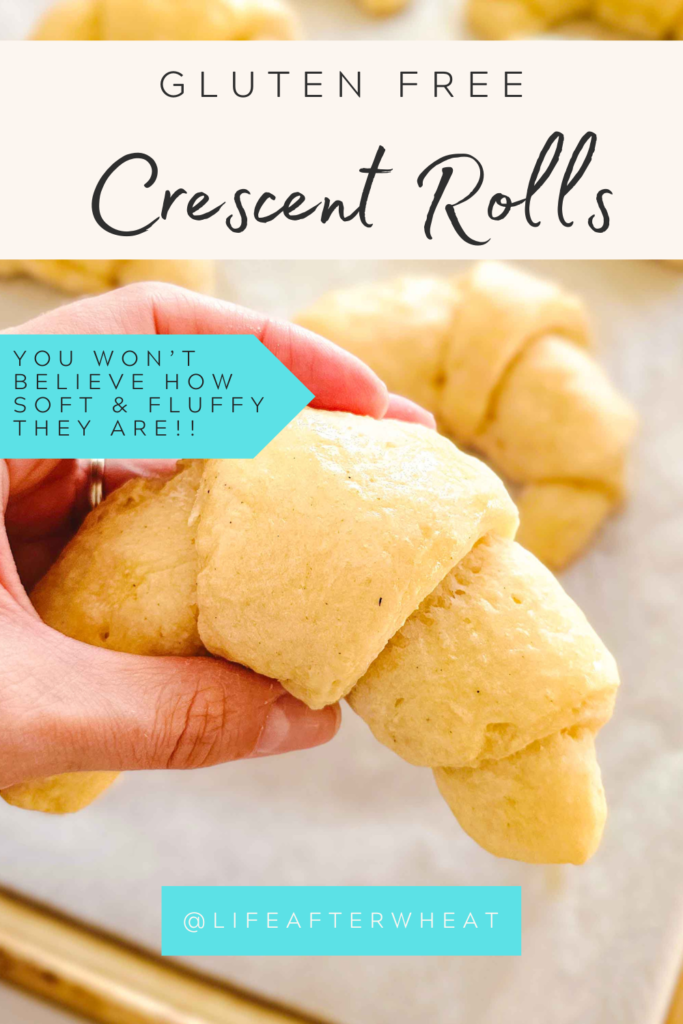
MORE GLUTEN FREE ROLL RECIPES YOU MIGHT LIKE
If you like gluten-free bread and rolls, you'll love my cookbook, How to Make Gluten Free Bread That Actually Tastes Good!
It walks you through every step and has pictures for each recipe. You can find my cookbook on Amazon or grab a digital copy for less!
FREQUENTLY ASKED QUESTIONS
Are Pillsbury crescent rolls gluten free?
No, Pillsbury does not currently make gluten-free crescent rolls. Pillsbury does, however, have a variety of gluten free mixes including pizza crust, cookie, brownie, and cake mix.
It is easy to make your own gluten free Pillsbury crescent roll copycat using this recipe!
Why aren't my crescent rolls rising?
There are many factors that affect rise. If your gluten-free crescent rolls aren't rising, check the following:
- Be sure you're using fresh yeast. To check your yeast, dissolve a teaspoon in warm water (about 110°F) with a pinch of sugar. If it becomes foamy within 5 or10 minutes, your yeast is likely still good to go. No bubbles? It's time to replace it.
- Check your flour. Gluten free flours vary widely. Plain rice flour will not work well in any recipe, and there are really only a few blends that perform well in yeast recipes like this one. I recommend gfJules for the best results, but you can also use my homemade gluten free flour blend, Better Batter, or even Cup4Cup in a pinch.
- Use the stir, scoop, and level method when measuring flour for gluten-free baking. This ensures that you don't end up with too much flour, which will stifle a rise. Stir the flour, gently scoop into a measuring cup (be careful not to pack it!) and level off with the flat side of a knife.
- Aim for sticky dough that is the consistency of a thick banana bread batter. If your dough seems to thick and dry, add a few tablespoons of water. If it seems too thin, add a couple tablespoons of gluten free flour.
- Warmth helps. Dough loves to rise in warm locations! Use the proof setting on your oven, turn the oven on and set your pan of rolls on top, or even set your baking sheet on a sunny section of counter.
GLUTEN FREE CRESCENT ROLLS RECIPE
These are absolutely the best gluten free crescent rolls and I just know you're going to love this easy recipe!
When you make it, would you please come back to leave a star rating or snap a pic and tag @LifeAfterWheat on social? I love to see you're making!
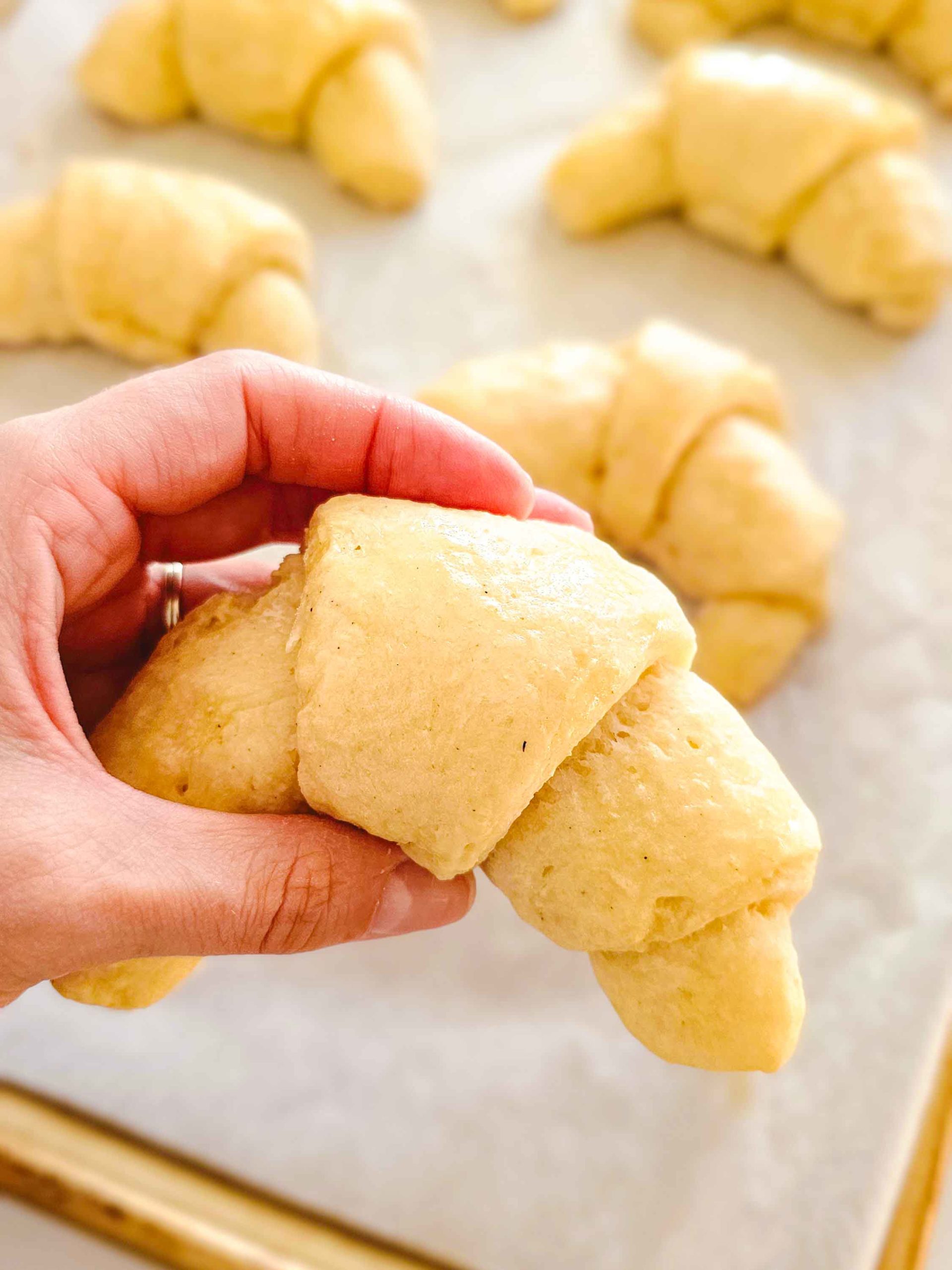
Gluten Free Crescent Rolls
Ingredients
Equipment
Method
- In bowl of stand mixer, measure gluten free flour, yeast, sugar or honey, baking powder, and salt.
- Add warm water, egg, and ½ cup butter or oil, and mix with paddle attachment on medium speed for 3-5 minutes.
- The dough should be a thick, sticky batter, like a thick banana bread batter.
- Lightly dust countertop or a pie crust bag with potato starch or gluten free flour.
- Scrape the dough into a ball shape on your dusted area and sprinkle a little more starch over the top of your dough to prevent it from sticking. If using a pie crust bag, remove air and zip it up.
- Using a rolling pin, roll dough out to about 14" circle. Using a pizza slicer (or very sharp knife) that has been dusted in starch or flour, cut the circle into 8 wedges. Carefully roll each wedge inward to form a crescent. If dough sticks to counter, you have not put enough starch/flour down. No worries, this happened to me too! Use a metal spatula to scrape extra potato starch onto the bottom of the dough as you roll it up. Gently pinch the end to secure the roll so it won't lose shape as it bakes. Use a little water to help if necessary. Gently place a few inches apart on a baking sheet and curve them slightly to form a crescent shape.
- Let rolls rise in a warm location for 20-40 minutes until they are close to double in size.
- Bake for 9-12 minutes at 350° F. Gluten free breads tend to not brown as much, so don't wait for these to be well browned before pulling them out or they may dry out. Flake with a fork in the center of a roll to see if it's done. Mine were done in about 11 minutes.
- Use a pastry brush to top with melted butter and serve warm for best results. Store leftovers in an airtight container or bread bag at room temp for a day or two, or in the freezer. These can easily be re-warmed by wrapping in foil and placing in a 325 degree oven for about 5 minutes from fridge or 10 minutes from freezer.
Nutrition
Notes
- When dusting your surface and the dough, don't work the starch into the dough. It's just meant to reduce the stickiness on the surface.
- I recommend gfJules gluten free flour
IF USING my homemade gluten free flour blend recipe:
- Add an additional 1 teaspoon xanthan gum to the recipe
- Substitute ½ cup of the flour mix for ½ cup potato starch

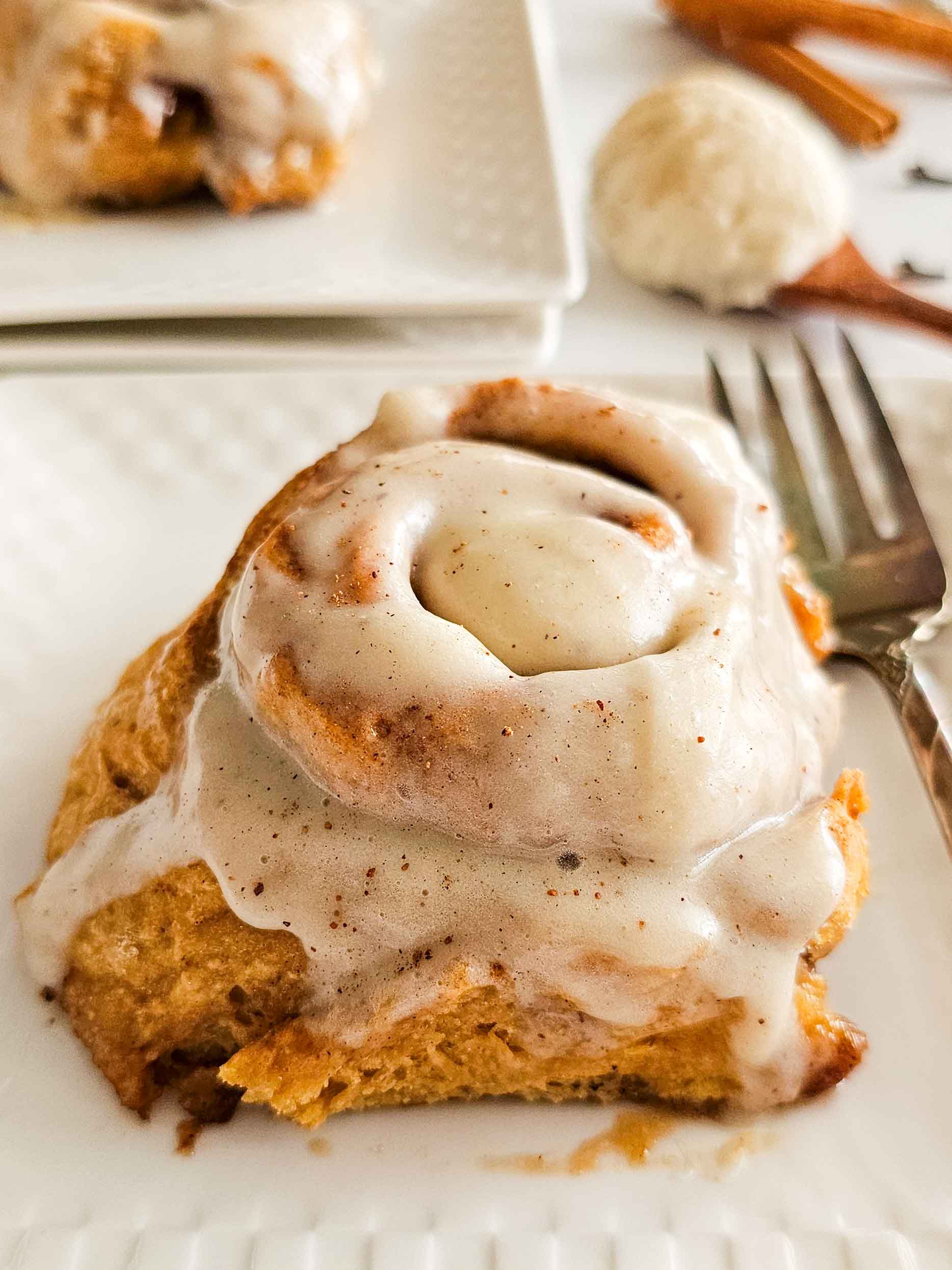
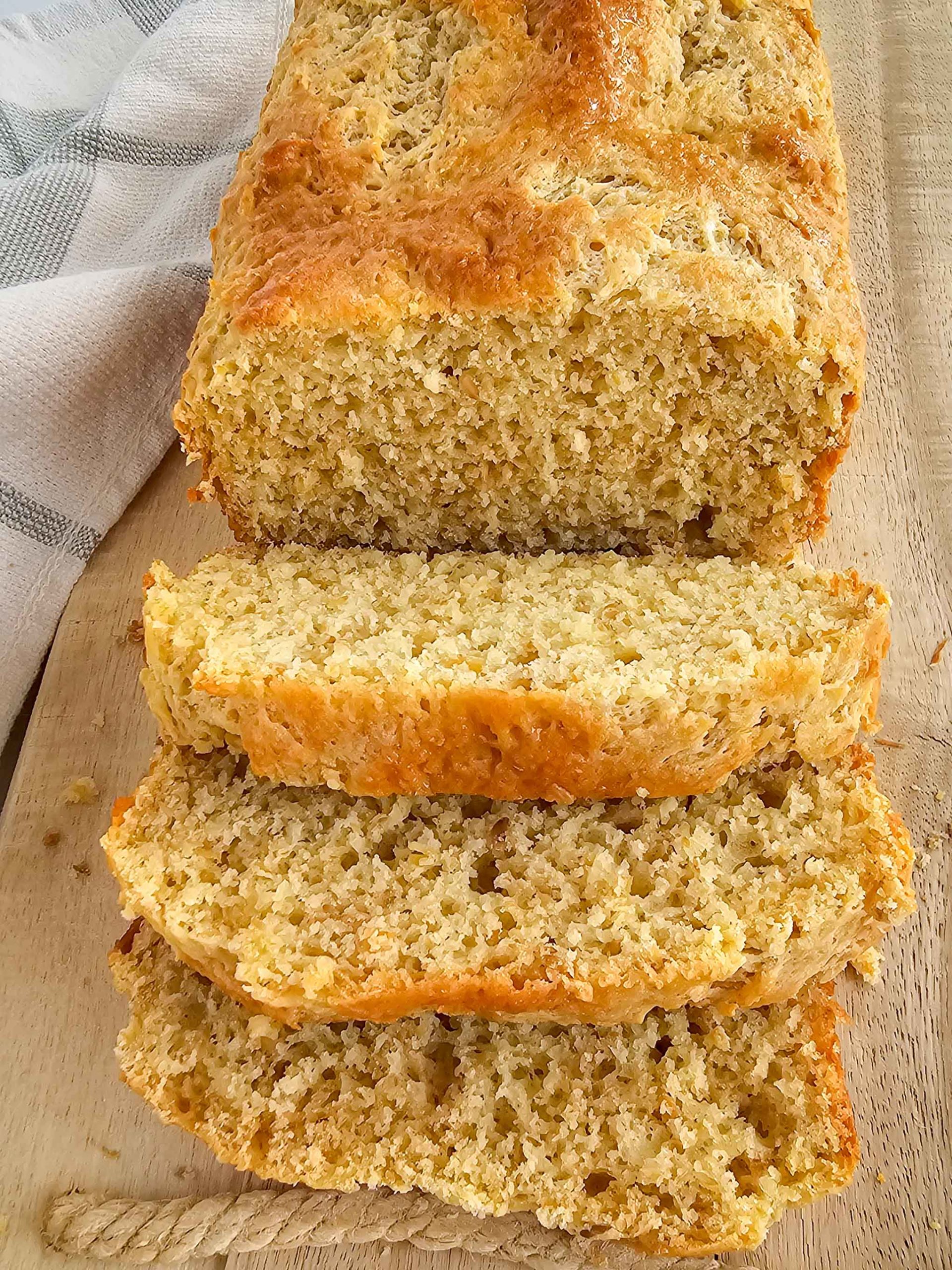
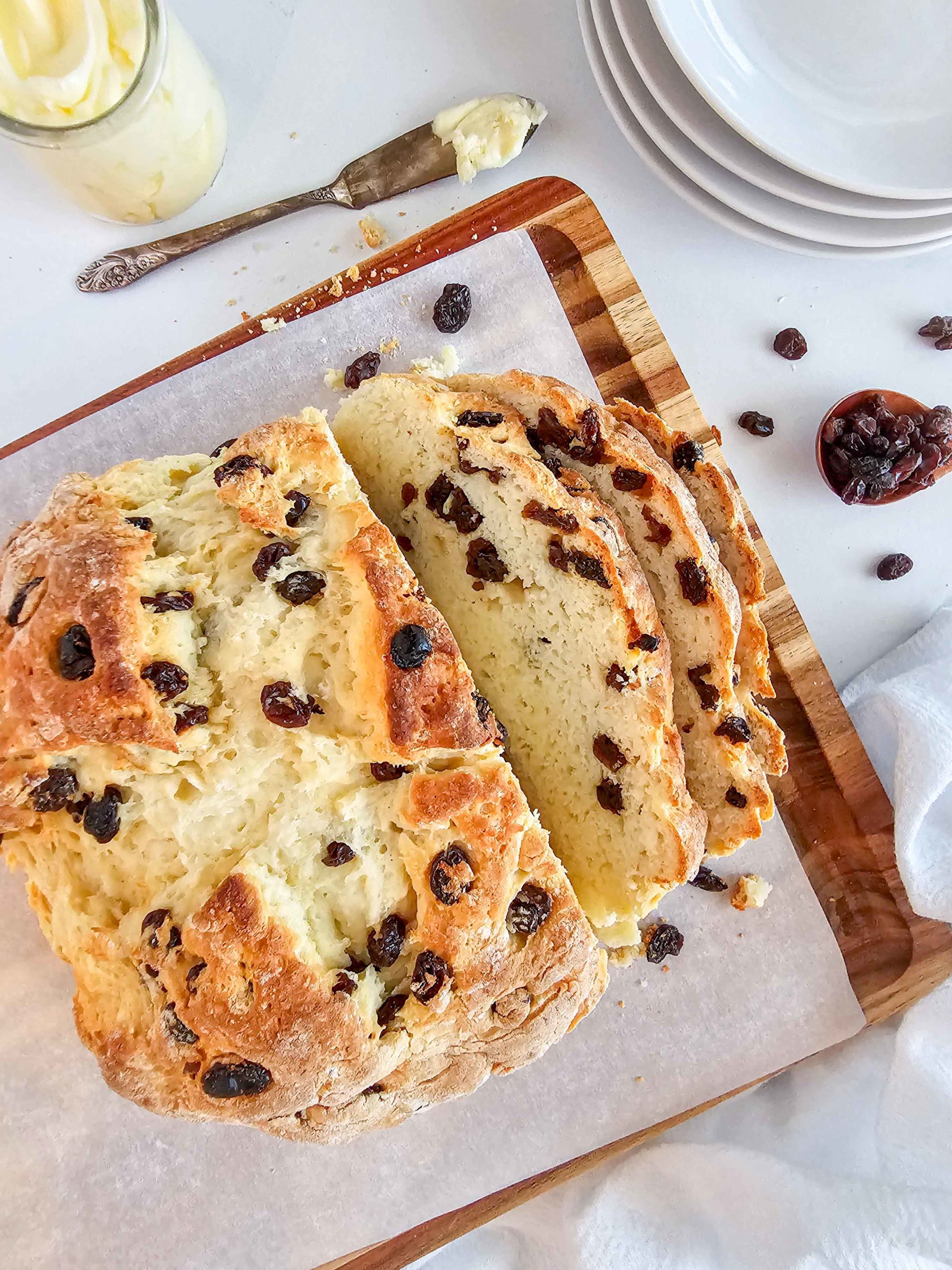
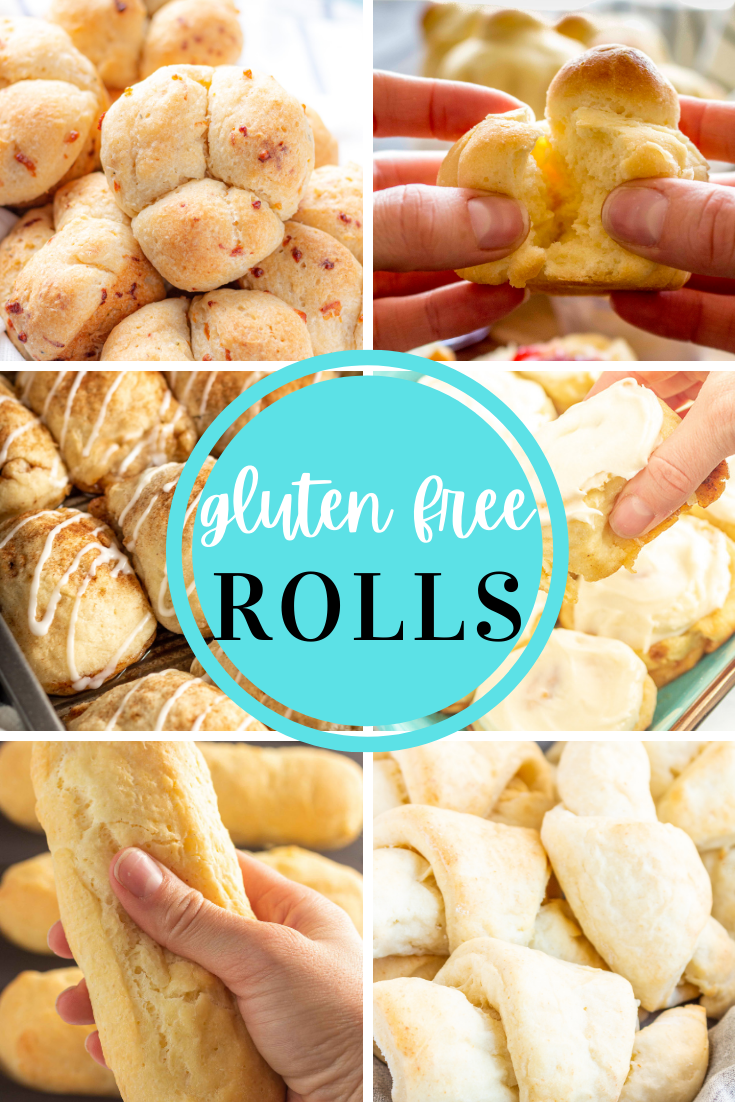
Melodie Bernhard says
Thank you more than I can say for developing this recipe. Years ago in US the Pillsbury Co created a recipe for peppermint crescent rolls using theirs in a paper column can. Since myself, daughter and now granddaughter must eaten gluten free I found your recipe this year and made them GF. They were amazing warm right out of the oven!
Helene says
Hello,
Thank you so much for sharing your recipe’s! I just bought your recipe book and I love it 😀Have you ever tried adding psyllium husk powder to the recipe? It usually help yeast dough to be more malleable so I am wondering if it would work in this instance?
Thank you and have a wonderful day!
Celeste Noland says
Yes, I've recently started adding a tablespoon or two and I have found that it does help the texture!
Erin says
Made these for Thanksgiving and placed them alongside the gluten rolls... this was the only basket that was empty by the end of the meal 😉
Celeste Noland says
Best compliment EVER!
kay says
The directions don't tell me when to add the psyllium husk so I had to guess. Judging by the fact that even by gluten free standards this dough wasn't workable I guessed wrong. Please include even optional ingredients in the directions of recipes, thank you.
T says
I'm not sure about the psyllium husk but my thoughts are this, I would add it to the water and mix it well. All the other bread recipes that I use mix the psyllium husk with water first.
Celeste Noland says
You can do that (you're right, many recipes do), but in this case I toss it right in and it works good too.
Wendy R Abt says
What if I don't have a stand mixer, what do you recommend I use instead? Thank you in advance.
Celeste Noland says
A hand mixer should work, if the dough climbs the beaters you can switch to mixing by hand with good old-fashioned elbow grease and a sturdy spoon.